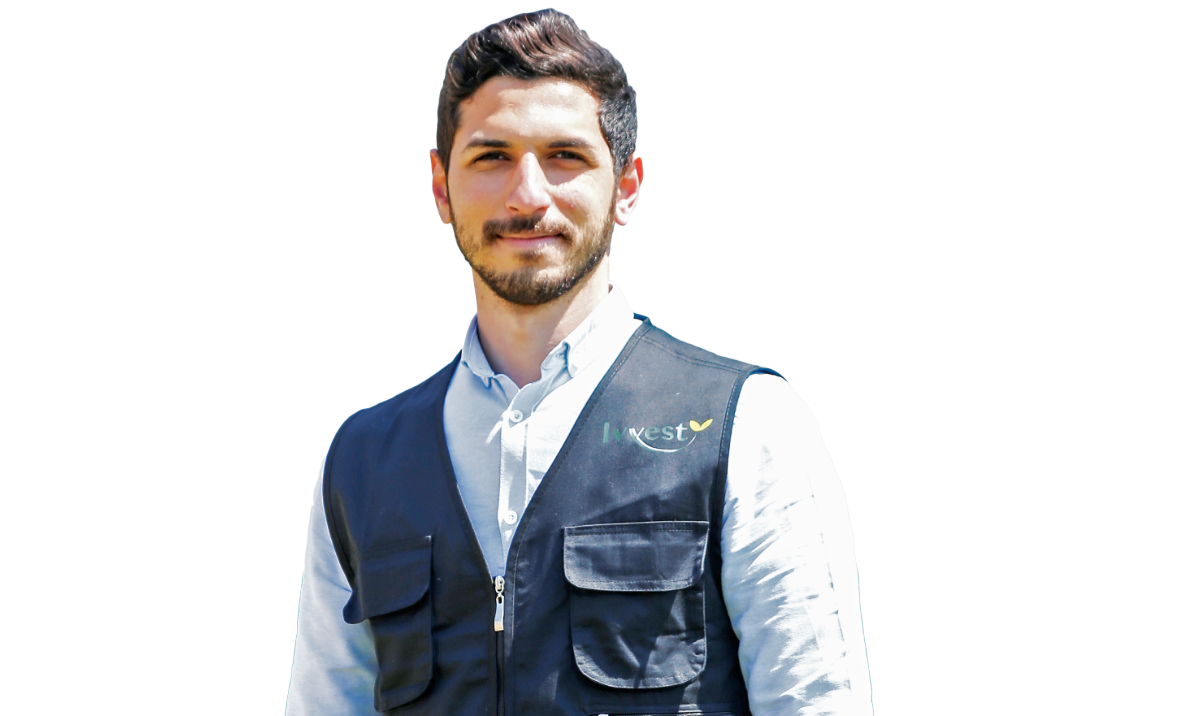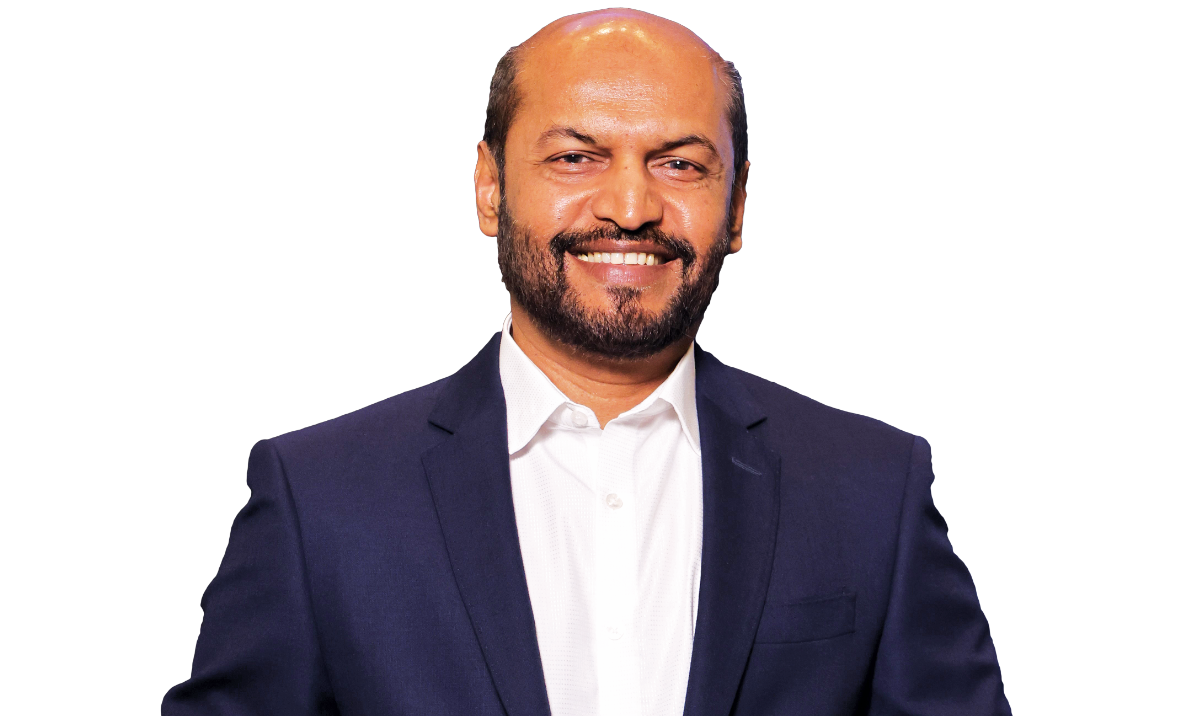RIYADH: Increasing the use of smart technology in farming is critical if the Middle East is going to truly achieve food security, experts have told Arab News.
As agricultural productivity in the region remains vulnerable to supply chain disruption, water shortages, and conflicts, the challenge of producing more food without further harming the environment intensifies.
Add in the consequences of climate change, and the Middle East needs to act fast — and smart — to ensure food security.
Vertical farms, increased use of data, and cross-country collaboration have all been flagged up to Arab News as key ways to tackle the short and long term challenges.
Abdel Rahman Al-Zubaidi, CEO of Ivvest, a Saudi-based agricultural technology and indoor farming company, emphasized to Arab News how his firm addresses these challenges: “Vertical farming allows exponential multiplication for the amount that can be produced in farms, enabling us to utilize vertical space and changing the way we design the production capacity from two dimensions to three dimensions.”
He added: “This is essential for getting the best out of our limited arable lands in the Middle East, where, for instance, Saudi Arabia’s arable land was just 1.6 percent in 2021.” Available in Saudi Arabia, Ivvest’s farming “Capsule,” is a smart container farming unit empowered with IvvestOS, an operating system that brings intelligence to the facility. Using this technology, farmers can produce more than 200 plants per sq. meter, all year long, without pesticides, and while consuming 90 percent less water and land, according to the company.
Sanjay Borkar, CEO and co-founder of FarmERP, talked up the importance of innovation in an interview with Arab News, stating: “Tools like drones, sensors, and data analytics — key components of precision agriculture — help farmers and agribusiness use resources wisely. By monitoring things like soil health and water levels in real-time, farmers can fine-tune the use of water, fertilizers, and other inputs, minimizing waste and maximizing yields.” Precision agriculture, soil health management, and improved water usage techniques are part of broader efforts to adapt to climate change and protect valuable resources.Many countries are adopting climate-smart agriculture, which integrates sustainable practices that improve resilience to environmental stressors while mitigating greenhouse gas emissions.
Water scarcity: A crisis across the region
Water scarcity is perhaps the most pressing environmental issue across the Middle East. Jordan is one of the countries most affected, facing severe water stress due to the combination of traditional irrigation methods and over-reliance on depleted water resources. The UN Food and Agriculture Organization and other international organizations are promoting precision agriculture techniques, such as drip irrigation and soil moisture sensors, to enhance water use efficiency and reduce wastage.

Vertical farming allows exponential multiplication for the amount that can be produced in farms.
Abdel Rahman Al-Zubaidi, CEO of Ivvest
Ivvest’s Al-Zubaidi explained that “indoor farming isolates the farming environment from the outside, ensuring optimal conditions for crops and reducing water loss from evaporation.”
He noted that these methods drastically reduce the need for pesticides, further increasing sustainability.
Conflict-driven food insecurity
While water scarcity is a severe concern, the Middle East’s food security crisis is also driven by conflict.
In correspondence with Arab News, the FAO said: “The ongoing war in Gaza has significantly exacerbated food insecurity in the broader NENA (Near East and North Africa) region by intensifying the already dire humanitarian crisis.”
The organization revealed that this conflict has disrupted supply chains, with the latest reports indicating that 95 percent of Gaza’s population faces high levels of food insecurity and nearly 343,000 people are at catastrophic risk of famine.
Local initiatives, such as urban farming and community-supported agriculture, have provided some relief to conflict-affected populations.
The impact of the Russia-Ukraine war
The global grain market has been severely impacted by the Russia-Ukraine war, with the Middle East feeling the effects more acutely than other regions. Countries including Egypt, Lebanon, and Yemen, heavily reliant on imports from these two major grain producers, are grappling with shortages.
As the conflict continues, food prices have soared, compounding the challenges faced by already vulnerable populations. The FAO’s call for investment in domestic agricultural production and the adoption of sustainable farming practices is particularly relevant for these nations.
The FAO said that hunger in Arab countries reached 59.8 million people in 2022, a 75.9 percent increase since 2000, accounting for 12.9 percent of the population compared to the global average of 9.2 percent.

Tools like drones, sensors, and data analytics — key components of precision agriculture — help farmers and agribusiness use resources wisely.
Sanjay Borkar, CEO and co-founder of FarmERP
Al-Zubaidi addressed how Ivvest can contribute to the region’s food security: “Our technology development started after a failed project with greenhouses, which ignited thorough research. We found that traditional greenhouses, while helpful, are resource-intensive and inefficient in hot climates like ours.”
He pointed out: “To overcome these risks, we designed and manufactured a full end-to-end indoor farming solution.” Ivvest’s vertical farming system allows producing over 240 plants per square meter, drastically enhancing productivity compared to greenhouses.
Zulfiqar Hamadani, CEO of Tanmiah Food Co., echoed the importance of local production, noting that “we must prioritize sustainable local production and develop resilient supply chains to ensure that we can meet the nutritional needs of our growing population.”
He highlighted Tanmiah’s commitment to Saudi Arabia’s Vision 2030 food self-sufficiency goals, adding: “Saudi Arabia is taking major steps, including significant investments aimed at enhancing food security and fostering innovation in food production.”
Phil Webster, partner at Arthur D. Little, told Arab News that the greatest adaptation going forward will occur in the areas of agriculture that are growing the most, receiving the largest investments, and offering the greatest overall potential for IoT usage.
“These would be the poultry and aquaculture sectors, the latter of which I gather has grown 183 percent over the last 5 years,” he said.
Webster expected some potential developments in the Kingdom: “Make Saudi Arabia self-sufficient or even a net exporter in more food products, to transform agricultural supply chains through a wholesale shift toward alternative protein, or enabling semi or fully automated indoor or covered farming to maximize productivity and reduce the cost of agricultural production.”
Innovative solutions: a path to resilience
In response to these growing challenges, several countries in the Middle East are investing in innovative agricultural solutions. The FAO emphasized to Arab News the importance of “sustainable and resilient farming practices, including soil and water conservation, waste reduction, and the implementation of nature-based solutions.”
Al-Zubaidi added that the key to sustainability in farming lies in integrating innovations into the broader supply chain.
Hamadani pointed out that the Middle East must “invest in innovative agricultural technologies such as precision farming, which optimizes resource use and minimizes waste.” He also emphasized the importance of sustainable practices that enhance soil health and water conservation.
Collaboration for a sustainable future
The FAO emphasized that collaboration between regional governments, international organizations, and local communities is crucial for building resilient food systems.
“Promoting climate-smart agriculture, such as diversified cropping systems and sustainable pest management, is crucial for enhancing agricultural resilience,” said the organization.
Al-Zubaidi added that the importance of partnerships between technology providers, distributors, and governments in achieving food security, describing them as “essential for creating a robust and sustainable food security framework.”
Hamadani also stressed the need for government support, noting that “clear policy frameworks that encourage research and development, alongside financial incentives for sustainable practices, are crucial.” He advocated for policies that support sustainable agricultural practices and reduce barriers for startups.
Borkar further elaborated, saying: “Collaborative partnerships between governments, tech companies, and local farmers are essential to share knowledge and ensure technology is accessible.” Grassroots initiatives like urban farming and water-efficient farming techniques can also empower communities and reduce their vulnerability to external shocks.
Partnerships and collaborations play a critical role in promoting the adoption and maintenance of digital technologies in agriculture, according to Webster. “The most important role of such collaborations is to ensure that there is good governance over the data that is collected at all parts of the food chain from farm to fork,” he added.




















